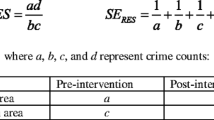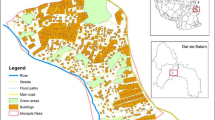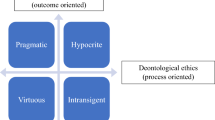Abstract
The pluralisation of policing has caused much debate in criminology. Yet very few studies examine how the public perceive private security. This article addresses this gap by drawing on empirical qualitative data from the 2014 Commonwealth Games in Glasgow. It makes an empirical contribution to the existing mega-events literature by showing how local residents from a community perceived private security within the context of their everyday environment. Findings show that perceptions of private security were overall negative. This was attributed to a perceived lack of local knowledge, perceived lack of professional expertise, perceived poor communication, and perceived authoritarianism among security actors. Such findings raise important implications regarding the normative legitimacy of private security at mega-events and society more generally.

Similar content being viewed by others
References
Aitken, Adam. 2021. Seeking invention: Creating an informed citizenry in the governance of security at sporting mega-events. Policing and Society 31 (3): 354–368. https://doi.org/10.1080/10439463.2020.1741586.
Audit Scotland. 2015. ‘Commonwealth Games’. Third Report Aavailable at: https://www.auditscotland.gov.uk/docs/central/2015/nr_150312_commonwealth_games_third.pdf (Accessed Dec 4, 2016).
Bakreski, Oliver. 2019. The role of private security in the protection of critical infrastructure in urban areas. Security Dialogues 2: 121–128.
BBC News. 2012. Glasgow 2014 Commonwealth Games Security Cost up 200%. Available at: https://www.bbc.co.uk/news/uk-scotland-glasgow-west-20769485 (Accessed July 7, 2016).
Beetham David. 1991. The legitimation of power. Basingstoke: Palgrave.
Bennett, Colin J., and Kevin, Haggerty. ed. 2011. Security games: Surveillance and control at mega-events. In Security games: Surveillance and control at mega-events, 1–19. Oxon: Routledge.
Boyle, Philip, and Kevin D. Haggerty. 2009. Spectacular security: Mega-events and the security complex. International Political Sociology 3 (3): 257–274.
Boyle, Philip. 2011. Knowledge networks: Mega-events and security-expertise. In Security Games: Surveillance and Control at Mega-Events, ed. J. Bennett. Colin and D. Haggerty. Kevin, 169–184. Oxon: Routledge.
Brodeur, Jean Paul. 2010. The Policing Web, 1st ed. Oxford: Oxford University Press.
Button, Mark. 2004. ”Softly, Softly", private security and the policing of corporate space. In Hard Cop, Soft Cop: Dilemmas and Debates in Contemporary Policing, ed. Roger Hopkins Burke, 101–113. London: Routledge.
Button, Mark. 2007. Security Officers and Policing. Aldershot, England: Ashgate.
Button, Mark. 2008. Doing Security, 1st ed. Basingstoke: Palgrave Macmillan.
Crawford, Adam. 2003. Contractual governance of deviant behaviour. Journal of Law & Society 30 (4): 479–505.
Coaffee, Jon, and David Murakami Wood. 2006. Security is coming home: Rethinking scale and constructing resilience in the global urban response to terrorist risk. International Relations 20 (4): 503–517.
Coaffee, Jon, P. Fussey, and C. Moore. 2011. Laminated Security for London 2012: Enhancing security infrastructures to defend mega sporting events. Urban Studies 48 (15): 3311–3327.
Edwards, Samantha. 2013. ‘Glasgow 2014 and Police Scotland Call For Private Security Input’. Campaignlive.Co.Uk. https://www.campaignlive.co.uk/article/glasgow-2014-police-scotland-call-private-security-input/1221452.
Eick, Volker. 2011. Lack of legacy? Shadows of surveillance after the 2006 FIFA world cup In Germany. Urban Studies 48 (15): 3329–3345.
Fitzgibbon, Wendy, and John Lea. 2017. Privatization and coercion: The question of legitimacy. Theoretical Criminology 22 (4): 545–562.
Fussey, Pete. 2015. Command, control and contestation: Negotiating security at the London 2012 olympics. The Geographical Journal 181 (3): 212–223.
Fussey, Pete, and Francisco Klauser. 2015. Securitisation and the mega-event: An editorial introduction. The Geographical Journal 181 (3): 194–198.
Fussey, Peter, Jon Coaffee, Gary Armstrong, and Dick Hobbs. 2011. Securing and Sustaining The Olympic City. London: Routledge.
Fussey, Pete, and Jon Coaffee. 2012. Balancing local and global security leitmotifs: Counter-terrorism and the spectacle of sporting mega-events. International Review for the Sociology of Sport 47 (3): 268–285.
Goold, Benjamin, Ian Loader, and Angélica Thumala. 2013. The banality of security: The curious case of surveillance cameras. British Journal of Criminology 53 (6): 977–996.
Giulianotti, Richard, and Francisco Klauser. 2009. Security governance and sport mega-events: toward an interdisciplinary research agenda. Journal of Sport and Social Issues 34 (1): 49–61.
Herald Scotland. 2014. ‘17 Private Companies To Provide Security, Stewarding At Glasgow 2014’. https://www.heraldscotland.com/sport/13162843.17-private-companies-to-provide-security-stewarding-at-glasgow-2014/ (accessed November 24, 2014).
Löfstrand, Hansen, Bethan Loftus Cecilia, and Ian Loader. 2016. Doing ‘Dirty Work’: Stigma and esteem in the private security industry. European Journal of Criminology 13 (3): 297–314.
Löfstrand, Hansen, Bethan Loftus Cecilia, and Ian Loader. 2017. Private security as moral drama: A tale of two scandals. Policing and Society 28 (8): 968–984.
Houilihan, Barrie, and Richard Giulianotti. 2012. Politics and The London 2012 olympics: The (In)security games. International Affairs 88 (4): 701–717.
Hughes, Gordon. 2007. The Politics of Crime and Community. Basingstoke: Palgrave Macmillan.
Johnston, Les, and Clifford Shearing. 2003. Governing Security. London: Routledge.
Kammersgaard, Tobias. 2021. Private security guards policing public space: Using soft power in place of legal authority. Policing and Society 31 (2): 117–130. https://doi.org/10.1080/10439463.2019.1688811.
Kim, Hyunho, Mark Button, and Julak Lee. 2018. Public perceptions of private security in shopping malls: A comparison of The United Kingdom And South Korea. International Journal of Law, Crime and Justice 53: 89–100.
Klauser, Francisco R. 2015. Interacting forms of expertise and authority in mega-event security: The example of the 2010 Vancouver olympic games. The Geographical Journal 181 (3): 224–234.
Livingstone, Ken, and Jerry Hart. 2003. The wrong arm of the law? Public images of private security. Policing and Society 13 (2): 159–170.
Loader, Ian. 1997. Policing and the social: Questions of symbolic power. The British Journal of Sociology 48 (1): 1. https://doi.org/10.2307/591907.
Loader, Ian. 2000. Plural policing and democratic governance. Social & Legal Studies 9 (3): 323–345.
Loader, Ian, and Neil Walker. 2007. Civilizing Security. Cambridge: Cambridge University Press.
Loader, Ian, Benjamin Goold, and Angélica Thumala. 2014. The moral economy of security. Theoretical Criminology 18 (4): 469–488.
Molnar, Adam. 2015. The geo-historical legacies of urban security governance and the vancouver 2010 olympics. The Geographical Journal 181 (3): 235–241.
Molnar, Adam, Chad Whelan, and Philip Boyle. 2018. Securing the Brisbane 2014 G20 in the wake of the Toronto 2010 G20: ‘Failure-inspired’ Learning in Public Order Policing. The British Journal of Criminology 59 (1): 107–125.
Molotch, Harvey. 2012. Against Security. Princeton: Princeton University Press.
Nalla, Mahesh K., and Cedrick G. Heraux. 2003. Assessing goals and functions of private police. Journal of Criminal Justice 31 (3): 237–247.
Nalla, Mahesha K.., and SylviaS.. Lim. 2003. Students’ perceptions of private police in Singapore. Asian Policing 1: 27–47.
Noaks, Lesley. 2000. Private cops on the block: A review of the role of private security in residential communities. Policing and Society 10 (2): 143–161.
Paton, Kirsteen, Vikki McCall, and Gerry Mooney. 2017. Place revisited: class, stigma and urban restructuring in the case of Glasgow’s commonwealth games. The Sociological Review 65 (4): 578–594.
Samatas, Minas. 2011. Surveillance in Athens 2004 and Beijing 2008: A comparison of the olympic surveillance modalities and legacies in two different olympic host regimes. Urban Studies 48 (15): 3347–3366.
Sarre, Rick, and Tim Prenzler. 2009. The Law Of Private Security In Australia. Pyrmont, NSW: Thomson Reuters.
Sarre, Rick. and Prenzler, T. 2011. Private security and public interest: Exploring private security trends and directions for reform in the new era of plural policing. Sydney: ARC Report.
Shearing, Clifford D., Philip Stenning, and SusanM. Addario. 1985. Public perceptions of private security. Canadian Police College Journal 9: 225–253.
Smith, Martin J., and Adam White. 2014. The paradox of security regulation: Public protection versus normative legitimation. Policy & Politics 42 (3): 421–437. https://doi.org/10.1332/030557312x655495.
Suchman, Mark C. 1995. Managing legitimacy: Strategic and institutional approaches. The Academy of Management Review 20 (3): 571–610.
Thumala, Angélica, Benjamin Goold, and Ian Loader. 2011. A tainted trade? Moral ambivalence and legitimation work in the private security industry. The British Journal of Sociology 62 (2): 283–303.
Van Steden, Ronald , and MaheshK.. Nalla. 2010. Citizen satisfaction with private security guards in The Netherlands: Perceptions of an ambiguous occupation. European Journal of Criminology 7 (3): 214–234.
Wakefield, Alison. 2003. Selling Security—The Private Policing of Public Space. Collumpton: Willan.
Whelan, Chad. 2014. Surveillance, security and sports mega events: toward a research agenda on the organisation of security networks. Surveillance & Society 11 (4): 392–404.
Whelan, Chad, and Benoît Dupont. 2017. Taking stock of networks across the security field: A review, typology and research agenda. Policing and Society 27 (6): 671–687.
Whelan, Chad, and Adam Molnar. 2018. Securing Mega-Events: Networks, Strategies and Tensions. London: Palgrave Macmillan.
White, Adam. 2010. The Politics Of Private Security: Regulation, Reform and Re-legitimation. Basingstoke: Palgrave Macmillan.
White, Adam. 2017. Beyond Iraq. Armed Forces & Society 44 (3): 387–407.
Wood, J., and C. Shearing. 2007. Imagining Security. Cullompton: Willan.
Yar, Majid. 2011. From the ‘governance of security’ to ‘governance failure’: Refining the criminological agenda. Internet Journal of Criminology 2011: 1–19.
Zedner, L. 2006. Liquid security: Managing the market for crime control. Criminology and Criminal Justice 6: 267–288.
Acknowledgements
I wish to thank the two anonymous referees for their informative and constructive comments.
Funding
This work was supported by the Economic and Social Research Council and Scottish Government [Grant Number 1624849].
Author information
Authors and Affiliations
Corresponding author
Ethics declarations
Conflict of Interest
The author declares that this submission is original, is not under consideration elsewhere and that there are no conflicts of interest to declare.
Additional information
Publisher's Note
Springer Nature remains neutral with regard to jurisdictional claims in published maps and institutional affiliations.
Rights and permissions
About this article
Cite this article
Aitken, A. Community perceptions of private security at a mega-event. Secur J 35, 987–1005 (2022). https://doi.org/10.1057/s41284-021-00309-y
Accepted:
Published:
Issue Date:
DOI: https://doi.org/10.1057/s41284-021-00309-y




